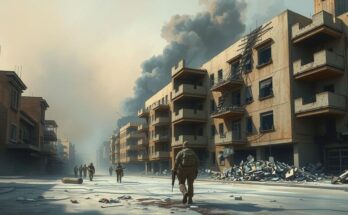The article discusses the challenges faced by the Lebanese army in protecting southern Lebanon from Israeli settlement plans framed under the concept of “Greater Israel.” It critiques the limitations on military preparedness imposed by U.S. orders and highlights the ongoing significance of both military and popular resistance against occupation. The article argues for the legitimacy of armed struggle as a means of securing sovereignty in line with international law.
Southern Lebanon has been the subject of a contentious narrative propagated by certain Israeli factions, defining it as northern Galilee and initiating plans for a settlement as part of an expansionist concept known as “Greater Israel.” This call has garnered support from members of the Knesset and investment firms eager to participate in the settlement projects, raising concerns about the potential implementation of such plans which were once deemed inconceivable in the West Bank.
The historical context of settlement expansions highlights that what seemed unattainable several decades ago can materialize when there is insufficient deterrence. The current military environment, particularly in Syria, serves as a poignant reminder of this reality. Reports indicate that the Lebanese army has been instructed by the United States to restrict any weapons intended for resistance forces in the south, implying a significant limitation on military preparedness against external threats.
Conflicting reports suggest that the Lebanese army may either seize or detonate weapons left by resistance fighters in strategic locations, primarily to prevent them from falling into Hezbollah’s hands. While historical movements have emphasized a continuous need for resistance against oppression, some voices within Lebanon are advocating for a limited perspective on the role of such resistance.
The notion that only the state should possess weapons is a relatively modern political concept and does not dismiss the inherent right of resistance under international law. United Nations Resolution No. 45/130 recognizes the legitimacy of struggle for liberation from foreign occupation, allowing for armed resistance as a means of defending one’s sovereignty.
The right to armed resistance has historical precedence, as evidenced by different global movements. Moreover, the legal framework established by the United Nations further supports the assertion that resistance is justified in the face of aggression. The validity of the resistance is ultimately defined by the righteousness of the cause it serves, such as the liberation of occupied lands and the protection of citizens’ rights.
The Lebanese resistance has historically been essential in expelling Israeli forces after a prolonged occupation. While the Lebanese army has demonstrated individual valor in various instances, it has often struggled against Israeli aggression, and in some cases, factions within the army have collaborated with occupying forces. Recent developments suggest that popular resistance tactics, alongside military efforts, have played a crucial role in addressing immediate threats and reclaiming territory.
The question remains whether the Lebanese army can effectively safeguard southern Lebanon against Israeli settlement efforts. This inquiry is raised in light of the army’s previous inaction amidst ongoing violations and a lack of significant military engagement to demonstrate its capabilities and commitment to protecting the land.
The ongoing situation in southern Lebanon raises significant concerns about the ability of the Lebanese army to protect the region from potential Israeli settlement initiatives. Despite international legal provisions supporting armed resistance against occupation, the current political and military dynamics suggest a complex interplay between resistance movements and state responses to external threats. The effectiveness of both military and popular resistance will ultimately determine the future of Lebanon’s sovereignty and territorial integrity.
Original Source: www.tehrantimes.com




